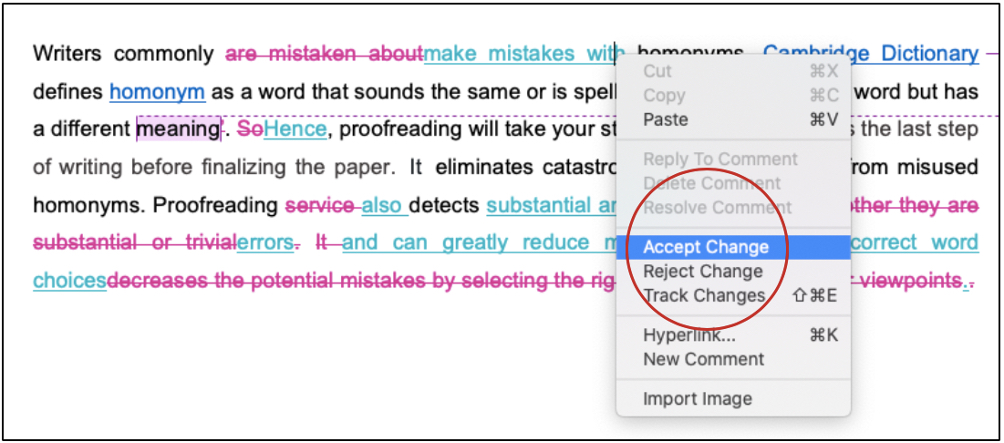Whether you are writing an essay for your publication or working on your research— academic writing style prevails for all types of academic work. It is not anything out of the world but does follow a few rules in terms of style and structure. If you are new to academic writing, the mention of 'rules' can be overwhelming. This article will help you with a few tips that help improve your academic writing.

This article discusses some effective tips to improve your academic writing style. To give you an opportunity to practice proofreading, we have left a few spelling, punctuation, or grammatical errors in the text. See if you can spot them! If you spot the errors correctly, you will be entitled to a 10% discount.
Whether you are writing an essay for your publication or working on your research— academic writing style prevails for all types of academic work. It is a style of writing that is generally used in the academic field. It is not anything out of the world but does follow a few rules in terms of style and structure. If you are new to academic writing, the mention of 'rules' can be overwhelming.
No need to panic! As we stated, academic writing is not that hard to adapt to. Yes, it does have certain formats and rules. However, with a little practice and the aid of tips, it can get pretty easy to get the hang of. That is precisely why this article exists. Here, we will help you with a few tips that can immediately help improve your style in academic writing.
One of the most important things about academic writing is structuring your content. You are not merely putting up a cluster of ideas on paper. What you are doing is expressing a purpose through your content. Thus, structuring your content is essential for academic writing.
You should focus on areas such as sentence structures, paragraph structures, and keep an eye on the overall structure as well. Begin your work with a question or a statement, and develop your writing based on that. Include only relevant data and information, as academic writing is all about preciseness.
Content is supposed to be based on information that is up to date. If revised data are not being considered to develop compelling content, then the content might be vague. The information that is being taken under consideration to prepare content is presumed to be validated and trustworthy. The content writer is expected to do useful homework and use the correct grammar while developing his write-up. To execute a grammar-wise accurate write-up, the writer should consider the best tone and the voice.
An excellent eye-catching headline or title is required to be provided by an author to attract prospective readers. According to Time magazine, a stunning 55% spent fewer than 15 seconds actively on a page. That means a reader usually spends approximately 15 seconds searching which content the user is supposed to go through. Therefore, the writers are recommended to include a beautiful opening and preparatory statement.
Another important thing to keep in mind when using academic writing style is to ensure that your content is written in an active voice. The simple reason is that it helps the meaning be clearer. While the passive voice can make a sentence complex, the active voice keeps it straightforward.
Also, active voice emphasizes the action occurring much better than passive voice. Therefore, make sure that every time you are writing for any academic purpose, always use an active voice.
To get any better in academic writing, one needs to practice more than anything. At first, so many rules and regulations may feel overbearing. However, as you keep on practicing, it will get easier to adapt to them.
Another great way to make sure that your academic writing style is on point is to get professional aid. Many editing and proofreading services can help you get your style and tone right. Also, with editing and proofreading services, you can make sure that your content is free of grammatical errors and is structured properly. Therefore, make sure to get professional editors and proofreaders to check your work before submitting it for publication. This will ensure that your work is on par in terms of quality and overall correctness.

Remember that the core factor of academic writing is that it is formal through and through. Therefore, you must stick to a formal tone, no matter what you are writing for. In other words, avoid using phrases that are common in daily conversations, slang, and informal tones.
Also, academic writing is all about facts and data. Therefore, there is no space for speculation and guesswork. All your content should be fact-based, supported by valid data. Academic writing, therefore, is all about factual content conveyed in a formal tone.
Although there is no universal rule against the use of the first person in academic writing, writers are mostly discouraged from using the first-person pronouns I and we in their writing, and the most common reason given for this is that readers may regard such writing as being subjective, whereas science is all about objectivity.
Now, we have understood that academic writing style does not demand informal tones and words. However, it also does not demand big words. The idea is to convey your ideas and thoughts clearly and precisely. For that, you do not need to use flashy or bigger words.
Stick to your vocabulary and use words whose meaning you are certain of. At the same time, do not use words that are too basic. To sum it up, use words that serve the purpose of conveying the required meaning without going overboard or underboard. You are trying to express and communicate your thoughts, not impress the readers with your words.
Best Edit & Proof expert editors and proofreaders focus on offering manuscripts with proper tone, content, and style of academic writing, and also provide an upscale editing and proofreading service for you. If you consider our pieces of advice, you will witness a notable increase in the chance for your research manuscript to be accepted by the publishers. We work together as an academic writing style guide by bestowing subject-area editing and proofreading around several categorized writing styles. With the group of our expert editors, you will always find us all set to help you identify the tone and style that your manuscript needs to get a nod from the publishers.
You can also avail of our assistance if you are looking for editors who can format your manuscript, or just check on the particular styles for the formatting task as per the guidelines provided to you, e.g., APA, MLA, or Chicago/Turabian styles. Best Edit & Proof editors and proofreaders provide all sorts of academic writing help, including editing and proofreading services, using our user-friendly website, and a streamlined ordering process.
Visit our order page if you want our subject-area editors or language experts to work on your manuscript to improve its tone and style and give it a perfect academic tone and style through proper editing and proofreading. The process of submitting a paper is very easy and quick. Click here to find out how it works.
Our pricing is based on the type of service you avail of here, be it editing or proofreading. We charge on the basis of the word count of your manuscript that you submit for editing and proofreading and the turnaround time it takes to get it done. If you want to get an instant price quote for your project, copy and paste your document or enter your word count into our pricing calculator.
Contact us to get support with academic editing and proofreading. We have a 24/7 active live chat mode to offer you direct support along with qualified editors to refine and furbish your manuscript.
Follow us on Twitter, LinkedIn, Facebook, Instagram, and Medium.
For more posts, click here.
How to Determine Variability in a Dataset
14.10.2023
How to Determine Central Tendency
19.02.2023
How to Specify Study Variables in Research Papers?
14.01.2023
Population vs Sample | Sampling Methods for a Dissertation
14.01.2023
How to Ensure the Quality of Academic Writing in a Thesis and Dissertation?
04.12.2022
How to Avoid Anthropomorphism in Your Dissertation?
04.11.2022
How to Write a Research Methodology Section for a Dissertation and Thesis
07.08.2022
How to Write a Theoretical Framework for a Dissertation and Thesis?
05.08.2022
How to Write Literature Review for a Dissertation and Thesis
02.08.2022
How to Write a Dissertation and Thesis Introduction
31.07.2022

Writing an academic paper is not similar to other forms of writing. It requires patience, knowledge, and the use of proper sentence construction. An academic paper should be informative, polished, and well structured. As a student or researcher, you should learn about bad habits and not repeat them in your academic writing. In this article, we discuss 6 bad habits to avoid in academic writing.
Continue Reading
Writing a research paper involves scrutinizing a plethora of research material to bring forth plausible conclusions. However, no matter the degree of impeccability and thoroughness of the research, successfully transmuting it into words takes a grave amount of practice and endurance. Thus, it is not uncommon to see amateur and even veteran scholarly writers commit research writing mistakes in their papers now and then. Following the narrative, this article will describe 5 research writing mistakes that frequently blemish the works of academic writers. It will also shed some much-needed light on the tips to amend and avoid these mistakes.
Continue Reading
We may have qualitative, quantitative, and mixed methods in dissertations. This blog will elaborate on quantitative dissertations, qualitative dissertations, and mixed methods dissertations by addressing their similarities and differences.
Continue Reading